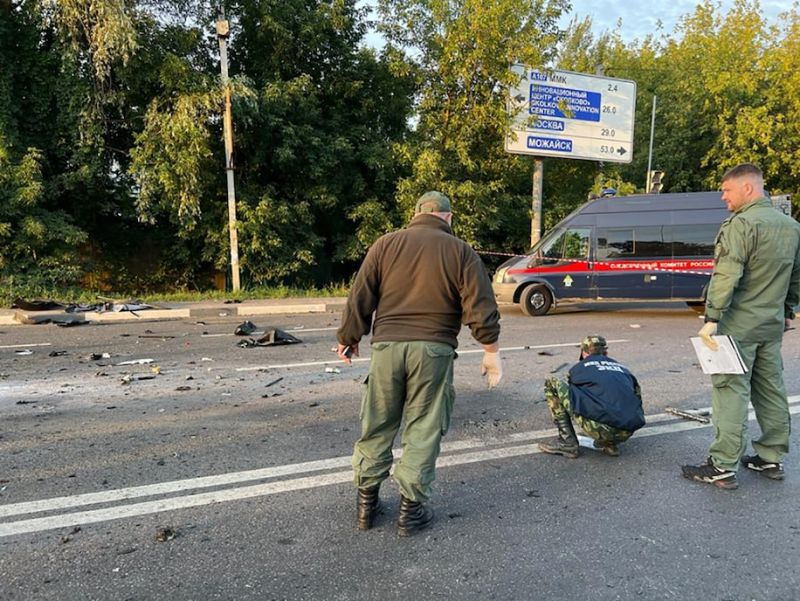
On Saturday, a car bomb killed the daughter of one of Russia’s most notorious nationalist ideologues. Alexander Dugin was supposed to join his 29-year-old daughter, Daria, in their car for a ride home after an event outside of Moscow; his decision to take a different vehicle at the last minute appears to have spared his life — leading to speculation that the bomb was actually aimed at him. His daughter died instantly.
The Russian government is blaming Kyiv for the killing. The accusation implies that the Ukrainians targeted Dugin out of revenge, since he was a fanatical advocate of the notion that Moscow should place reconquering Ukraine at the heart of a new Russian empire. The Ukrainians are denying responsibility for the killing. Mykhailo Podolyak, a senior adviser to President Volodymyr Zelensky, says that his country “had nothing to do with” the bombing “because we’re not a criminal state, like the Russian Federation is, and moreover not a terrorist state”.
It’s hard to know the truth in a case as bizarre as this one. But there is one reliable rule to go by: Don’t believe whatever the Kremlin says. A few things to keep in mind as we try to sort out what happened:
First, Dugin is far less important than some people are suggesting. He’s not “Putin’s brain”. There is no evidence that Dugin has ever met Putin in person, much less offered him regular advice, and I am yet to be convinced that the Russian president spends his leisure time poring over turgid political tracts. Putin didn’t have to read Dugin’s writings to come up with plans to annex Crimea or undermine Ukrainian statehood — both of those ideas have long been widespread among certain members of the Russian elite. Putin has his own brain.
Second, killing Dugin will likely have zero direct effect on Russia’s war against Ukraine. Staging such an attack in Putin’s backyard might boost Ukrainian morale a bit. But that seems like a lot of risk for the sake of eliminating someone who plays no actual role in the conduct of the war. Dugin, it is worth noting, has no government position; his only function is as a propagandist — and Russia is oversupplied with those. (Both Dugin and his daughter have indulged in genocidal rhetoric against Ukrainians — which, sadly, places them solidly in the mainstream of Russian public discourse today.)
And that brings us to the most important point — that we shouldn’t take Kremlin statements at face value. Russia is a paranoid dictatorship prosecuting one of the most brazen acts of international aggression in decades. In 2014, Putin wholeheartedly denied that his troops were seizing control of Crimea until the operation was finished; today, six months after the start of the invasion, it remains a crime to state the truth that Russia is waging “war” in Ukraine. Dictatorships, by their nature, do not deal in truths. Any information released by the Russian authorities should be treated less as a description of reality than as a political tool.
Note that within hours of Daria Dugina’s killing, the Russian security service, the FSB, claimed that it had already identified the culprit: a Ukrainian woman who somehow managed to get away to Estonia (some 500 miles away) after planting the bomb. The agency didn’t explain why the suspect, identified as Natalya Vovk, chose to carry out the operation in the company of her 12-year-old daughter — highly unusual tradecraft, to say the least. (The FSB also claims to have acquired an ID card showing Vovk’s membership in a Ukrainian nationalist organization.)
The Russian state — under Putin and before him — has a long history of manufacturing or manipulating events to suit its agenda. In 1999, then-Prime Minister Putin notoriously seized upon a series of bloody terrorist bombings in Moscow and the heartland to launch a new war against the rebellious Chechens, whom he blamed for the attacks; his hard-line response boosted his own power and his subsequent revival of the police state. To this day, however, the FSB has failed to provide an adequate explanation for a bomb that was discovered to have been planted by its own operatives. (The security service dismissed the incident as part of a “training exercise”.) We may never know the full truth.
Could Russians have carried out the attack on Dugin? A mob hit of some kind, perhaps? There is another possibility: Fearing a public backlash, Putin has so far notably hesitated to declare a general mobilization that might give Russia an even greater advantage in Ukraine. A gruesome attack on a prominent “patriot” right in the suburbs of the capital could be just the thing to whip up flagging public enthusiasm for a bloody conflict that has already dragged on for much longer than anyone in Russia anticipated.
We may learn more in the days to come. But remember: The Kremlin’s explanations can’t be trusted.
Christian Caryl is an editor with The Post's Opinions section.
